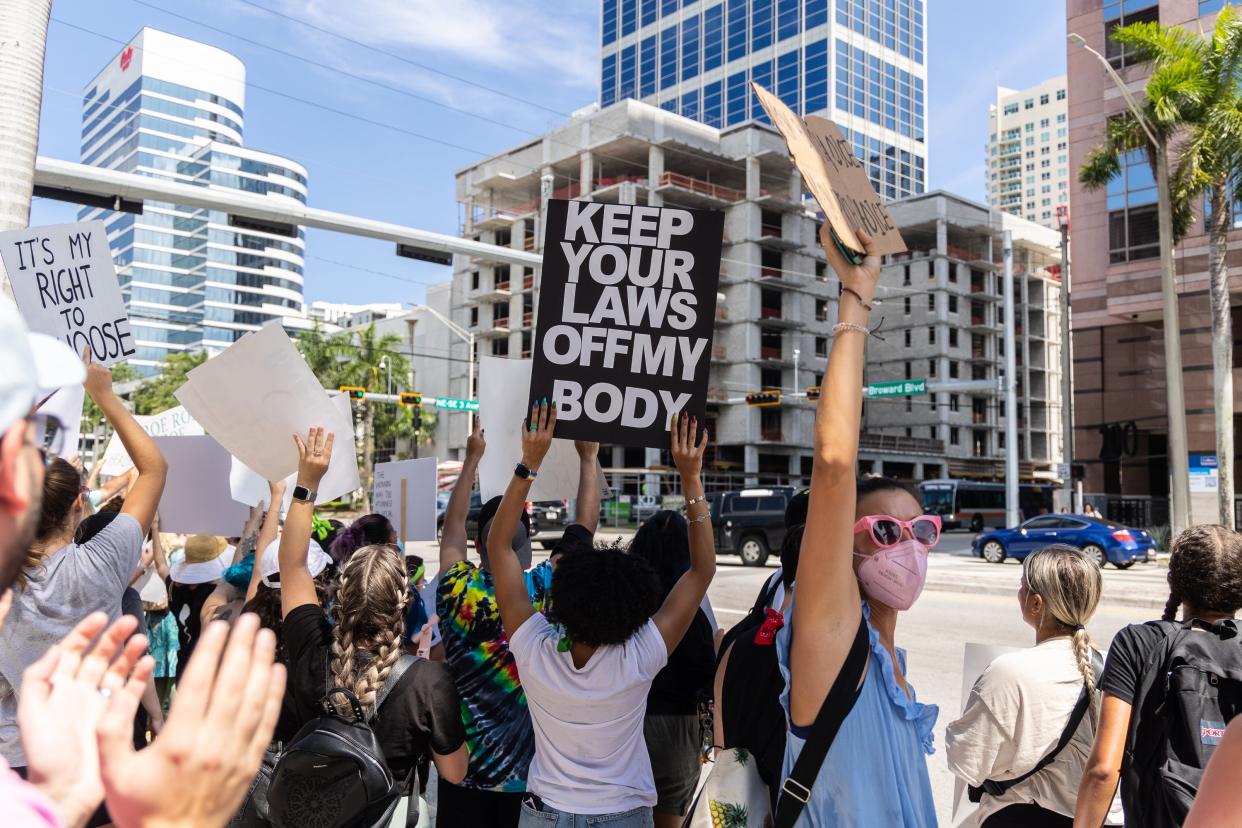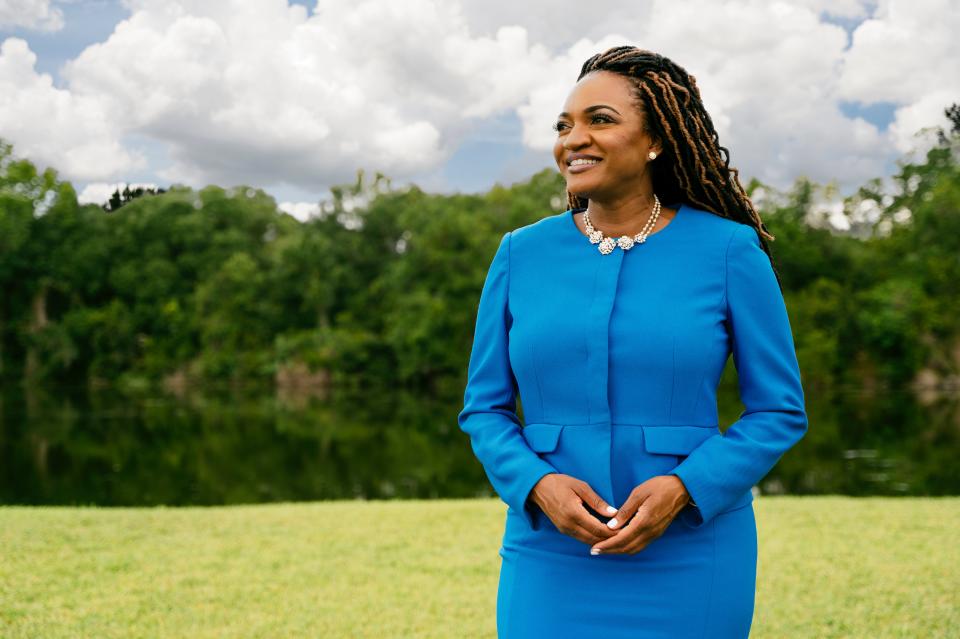Florida Abortion Ban and Ballot Initiative: Fentrice Driskell Explains the Stakes

John Parra/Getty Images
On May 1, a six-week abortion ban will take effect in Florida, severely limiting reproductive rights not only in the state but throughout the southeastern United States. At the same time, a ballot initiative set to enshrine abortion access in the state's constitution could turn Florida into one the fiercest battlegrounds over the future of reproductive rights in the country.
A six-week ban "is about as close to an outright ban as you can get — most women don't know they're pregnant at six weeks," Florida House Minority leader Fentrice Driskell (D) tells Teen Vogue. "Women will have less access to health care,” she adds. “It's a dark day for Florida."
Both of these major developments hinge on decisions passed by Florida’s conservative-leaning state Supreme Court. In a 6-1 ruling, the court upheld Ron DeSantis' Heartbeat Protection Act, in a decision that will make North Carolina the only state in the southeast to allow abortions before 12 weeks.
In a separate ruling, the justices green-lighted a 2024 election ballot initiative that would enable Floridians to enshrine abortion access in the state's constitution if approved by 60% of voters.
As abortion clinics prepare to shut down in Florida — and brace for a patient surge in North Carolina — Democrats have set their view on an uphill battle to make Florida competitive for progressive politics after years of near-total Republican control.
Shortly after these decisions came down, Teen Vogue spoke with Driskell by phone about the future of abortion access in Florida, the struggles of state Democrats, and why Florida's youth should hold onto hope.
This interview has been condensed and edited for clarity.

Teen Vogue: North Carolina is the only state left in the southeastern US with a 12-week abortion ban; South Carolina, Tennessee, Alabama, and now Florida all have stricter laws. What should we expect in the coming months?
Fentrice Driskell: We were hearing from providers that they are treating patients from all across the southeast. So, with the six-week abortion ban, we can expect that women who have the means to travel out of state and get abortion care will.
But there are many women who do not have the economic means to travel out of state. The law is now treating these women differently, effectively punishing them because they're poor, on top of inserting the government into their personal medical decisions. So it's bad for Florida, but also it's really bad for the southeast.
TV: On the subject of about personal freedom, the Florida constitution has a statute protecting people from government intrusion. Forty years ago, the Florida Supreme Court decided that this provision protected the right to abortion. Now, according to the court, it doesn't anymore. How come Florida is more conservative today than it was in the '80s?
FD: This is not unique to Florida. And this is absolutely the handiwork of Donald Trump. He appointed Supreme Court Justice Amy Coney Barrett to the United States Supreme Court, who said that she would uphold Roe v. Wade, and then she didn't.
So he was able to tilt the Supreme Court in his favor, which then paved the way for states with Republican-controlled legislatures, like Florida, to overturn abortion access, because they thought that that's what their base wanted.
What's interesting, though, is that in Florida, and we've seen this now in Alabama, too, most Americans actually do want safe access to abortion care.… I think this is a MAGA-captured state. Republicans have been in control for a very long time. They have used redistricting to gerrymander maps to favor themselves, so they continue to keep the majority. But I don't actually think their values represent what most Floridians want. They are out of touch, and this is what's happening with abortion access.
With these bans, they are showing their arrogance and their hubris, and I think it will backfire on them this November.
TV: The ballot initiative in November promising to enshrine abortion access in the Florida constitution got close to a million signatures — that's a lot of people. But also, for it to pass, it will need 60% approval across the state. Do you think something like that is possible in Florida?
FD: Yeah, I do. But I don't think that just the language in the ballot is enough. We still have to persuade voters, we still have to talk to voters. We need to do turnout effectively.
But what this ballot measure does, especially when you also consider that there's a ballot measure on adult use for marijuana, it gives us the lane and a pathway to talk to voters about issues they care about. And that's how we flipped a seat in the [District 35] special election. So we've got the right formula. We have to go out en masse and make sure that people show up at the polls.
Part of the reason I know that this is doable is that Florida voters have a history of passing measures that are center-left, whether it was a $15 minimum wage, or back in 2018, when we passed the constitutional amendment, which would give formerly convicted felons the right to vote — that passed by 64%.
So, you know, 60%. We can't take it for granted. We have to work hard, but it's doable. Floridians know how to do this.
TV: You mentioned that state Democrats now have the right formula — what is that formula?
FD: That really does speak to turnout. You know, so you have to be able to knock on doors, and you have to get your message out. That's what we did [during the special election]. We were disciplined in our messaging. We didn't talk about every issue under the sun. We talked about two issues — the issues that voters wanted to talk about — which were abortion access and affordability.
Now this is going to be different for every community. Abortion is not the top issue for every community, and that's okay. We just have to be thoughtful and culturally competent and relevant. No matter who it is we're talking to, we need to make sure that we're talking about the issues that matter to them. And that's how it is, that's how it's doable.
It takes the grassroots. I mean, I really think that President Obama showed us that in 2008 and 2012 when he flipped Florida blue. It was because he had an impressive ground game and he had a strong message. And that is how we will take back the state. It's got to be peer to peer.
TV: That also sounds very expensive. The Democratic National Committee has ignored Florida in the sense of funding, even before 2022. What is different now?
FD: Well, I think our national partners have been looking for proof of concept, because we have lost some statewide races in a truly excruciating fashion. I get how that must be frustrating to a national donor. So they've been looking to see whether or not we have proof of concept that the state is winnable again.
I look at three recent victories to demonstrate that proof of concept: First is Mayor Donna Deegan's win in Jacksonville — she's the first Democrat to win there in 12 years; I look at the special legislative seat that we flipped in January; and I look at our ability to get abortion access on the ballot.
So, in my conversations with folks on the national level, I think that the Biden administration is going to play. The Biden campaign indicated that they want to invest in Florida, and I think that makes a difference.
TV: What would you tell a young person in Florida who is worried about their future? What can they do to move the needle?
FD: First of all, I understand. I am a Black woman who is a Florida native. I know what it is like to face discrimination and low expectations in my life. Both as a minority and a woman, I understand that things are really difficult.
But I also remember a time in the state when we were moving in the right direction. When I was a kid, we were moving in the right direction. Our public schools were strong. We believed in diversity, equity, and inclusion, and we promoted policies that were more inclusive.
What I would say to young people is that I understand. I see you. I can feel your pain because I've experienced pain in my own life. But you do not give up.
Every tactic that Ron DeSantis has employed is designed to make us feel overwhelmed and to give up hope, and we should not give them the satisfaction. We should fight back. I am fighting back. I will continue to fight back. But I need some help.
Especially when I talk to groups of young people, I ask them if they remember the game of tug-of- war when we were kids. Everybody remembers that game with the rope, right? Pull back and forth. And I ask them, “So what happens if the kids from the neighborhood next door show up with more players than your team?” And they're like, “Oh, well, then our team loses, right?”
That's all voting is. It's a giant game of tug-of-war, and you have to be a good team player and show up for your team. Voting is a team sport. This is why we must show up.
It's not complicated, it's just tug-of-war.
Stay up-to-date with the politics team. Sign up for the Teen Vogue Take
Originally Appeared on Teen Vogue
Want to read more Teen Vogue abortion coverage?

